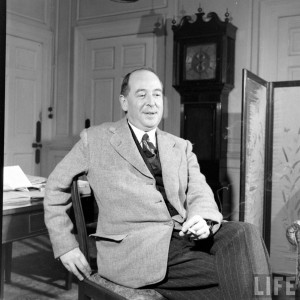 C. S. Lewis’s “God in the Dock” essay exposes one of the biggest obstacles we face in transmitting the Gospel message: the unwillingness of people to acknowledge they are guilty of anything and are in need of a savior. What Lewis says in this essay has become even more conspicuous in our day.
C. S. Lewis’s “God in the Dock” essay exposes one of the biggest obstacles we face in transmitting the Gospel message: the unwillingness of people to acknowledge they are guilty of anything and are in need of a savior. What Lewis says in this essay has become even more conspicuous in our day.
He writes of what he learned when he spoke to Royal Air Force (R.A.F.) audiences during WWII. One of the first things he learned was that they were skeptical of anything historical. They knew about “the pseudo-scientific picture of the ‘Cave-man'” and had some “picture of ‘the Present.'” But between these, there was nothing. I can affirm that the current generation of students is somewhat similar to this, except they perhaps have no knowledge of the ancient as well. They kind of know what happened during their own lifetimes, and that is all.
Then we come to his discussion of the awareness of sin, or rather the lack of awareness:
The greatest barrier I have met is the almost total absence from the minds of my audience of any sense of sin. . . . The early Christian preachers could assume in their hearers . . . a sense of guilt. . . . Thus the Christian message was in those days unmistakably the Evangelium, the Good News. It promised healing to those who knew they were sick. We have to convince our hearers of the unwelcome diagnosis before we can expect them to welcome the news of the remedy.
 This is a great deception, of course, and one we actively cultivate. I believe everyone does realize the problem, but we do our best to convince ourselves that we are, nevertheless, acceptable to God regardless of our shortcomings. We love to use words like “shortcomings” and “mistakes” rather than “sin.” They sound much less accusatory.
This is a great deception, of course, and one we actively cultivate. I believe everyone does realize the problem, but we do our best to convince ourselves that we are, nevertheless, acceptable to God regardless of our shortcomings. We love to use words like “shortcomings” and “mistakes” rather than “sin.” They sound much less accusatory.
Even though we are the ones who are to be condemned for our rebellion, we use all manner of twisted logic to make God the one who should be ashamed of Himself. As Lewis notes,
The ancient man approached God (or even the gods) as the accused person approaches his judge. For the modern man the roles are reversed. He is the judge: God is in the dock. He is quite a kindly judge: if God should have a reasonable defence for being the god who permits war, poverty and disease, he is ready to listen to it. The trial may even end in God’s acquittal. But the important thing is that Man in on the Bench and God in the Dock.
What hubris. What obnoxious vanity. What utter illusions we create. What we really need to do is humble ourselves before the Lord of all, devastated by the knowledge of our supreme selfishness, and earnestly plead for His mercy. For some reason, He loves us anyway and pours out that mercy on the most undeserving. He is not a God who should be in the dock, rebuffing our accusations. We should be eternally grateful He is willing to listen to us at all.
